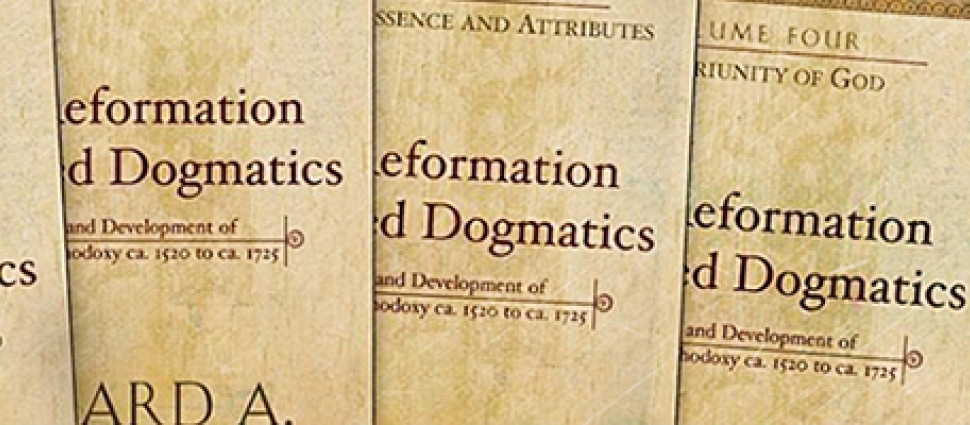A Year in PRRD (Week 9)

Mar 7, 2018
Every Wednesday in 2018, Michael Lynch (PhD candidate at Calvin Theological Seminary) and our own editor Danny Hyde (PhD candidate at Vrije Universiteit Amsterdam) will be blogging through Richard Muller’s Post-Reformation Reformed Dogmatics, 4 vols. (2nd edition, Grand Rapids: Baker Academic, 2003).
These volumes are currently out-of-print but used copies can be found online here. For a schedule of weekly readings, go here.
Week 9 (2/26-3/4): I.2.8 (pgs. 360–405)
This past week’s reading was especially apropros considering the third installment of Richard Muller’s review of Scott Oliphint’s book on Thomas Aquinas. In fact, there is even some overlap. In this blog post, I want to discuss two important points Muller makes in this chapter: the first, a methodological point and the second regarding the Reformed reception of philosophy. On pages 361-62 Muller writes:
From a purely historiographical perspective, the problem of much of the theological scholarship on Protestant scholasticism lies in its neglect of the history of philosophy in the seventeenth century – not the history of philosophy writ large in the thought of Descartes, Spinoza, and Leibnitz, but the history of philosophy writ small, in the thought of the many significant thinkers in the academies and the universities, whose work has all too often been ignored in the broad surveys.
What Muller complains about here is what he identifies elsewhere as the “great thinkers” approach to history which has its dangers. In its most basic form as applied to Reformed theology, it means that we allow John Calvin, William Perkins, John Owen, and maybe Francis Turretin to set the standard for what Reformed theology looks like (and presumably the Reformed view of everything else!) in the early modern period – overlooking the massive amount of very influential theologians who have largely been lost to history. One reason for this “great thinkers” approach to history can be accounted for by the fact that scholarship often limits itself to modern reprints in English. The great thinkers approach to history is also sustained by the choices of various publishers. Which early modern thinker gets republished today is not always indicative of how influential such a thinker was in his own day. Gisbertus Voetius was far more influential for Reformed theology in the early modern period than nearly every Puritan. When was the last time you picked up and read anything by Voetius? How should one go about trying to discern, say, the early modern Reformed approach (if we can say such a thing; see point two below) to metaphysics? Nearly everything written in the early modern period on the topic from Reformed scholars in England, Scotland, the Netherlands, France, Germany, Switzerland is in Latin, written by scholars we no longer read (nor have even heard of)! But that hardly means that such writings were not influential – sometimes massively influential – in their own day.
This leads me to a second important point found in Muller’s chapter, namely, the eclecticism of philosophy practiced by Reformed scholars in the early modern period. There actually is not “a” Reformed philosophy to be found in the early modern period. To be sure, there is a broad Christian Aristotelian background which shapes the language and general metaphysical assumptions of the great majority of theologians and philosophers whether they be Roman Catholic, Lutheran, or Reformed, but that didn’t mean that they all saw themselves as Peripatetics (or followers of Aristotle). As Muller makes clear, the basic philosophical notions of act and potency, fourfold-causality, substance and accidents, hylomorphism, were all standard assumptions across the early modern theological landscape. Yet, once one went beyond these basic characteristics of Aristotelian thought, various disagreements and pluralities of thought respecting various knotty questions emerged, often with the incorporation of new discoveries such as those of Copernicus or the mechanical philosophy of Pierre Gassendi. Dogmatism in committing oneself to the various philosophical schools was often frowned upon. Even though some theologians and philosophers (including some Reformed) in the later 17th century sought to displace certain Aristotelian assumptions such as fourfold causality, this was often done piecemeal rather than as a wholesale rejection. In short, these observations are helpful reminders that history is messy and generalizations are hard to come by when thinking about the early modern period. Reformed theologians and philosophers did address many of the oft-debated questions found today in our universities and think tanks, but if you want to know what the early modern Reformed believed, you must go read them, widely and deeply.
Join us next Wednesday as Danny Hyde blogs through the reading for Week 10 (3/5-3/11): I.2.9 (pgs. 406–450).
Meet the Puritans is a conversation of the Alliance of Confessing Evangelicals. It is supported only by its readers and gracious Christians like you. Please prayerfully consider supporting us.
For previous posts in this series, see:
Week 2: I.1.1.2–3 (pgs. 46–84)





